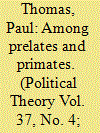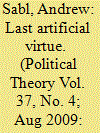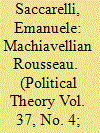|
|
|
Sort Order |
|
|
|
Items / Page
|
|
|
|
|
|
|
| Srl | Item |
| 1 |
ID:
090130


|
|
|
|
|
| Publication |
2009.
|
| Summary/Abstract |
Darwin's understanding of evolution as involving his original concept of natural selection involves discussions of development, progress, human pride, the construct o `primitivism,' and slavery. These discussions have to a remarkable extent been ignored by political theorists. This omission is all the more surprising in that these same discussions also call to mind Rousseau's often misunderstood concept of perfectibility.
|
|
|
|
|
|
|
|
|
|
|
|
|
|
|
|
| 2 |
ID:
090133


|
|
|
|
|
| Publication |
2009.
|
| Summary/Abstract |
David Hume's position on religion is, broadly speaking, "politic": instrumental and consequentialist. Religions should be tolerated or not according to their effects on political peace and order. Such theories of toleration are often rejected as immoral or unstable. The reading provided here responds by reading Hume's position as one of radically indirect consequentialism. While religious policy should serve consequentialist ends, making direct reference to those ends merely gives free reign to religious-political bigotry and faction. Toleration, like Hume's other "artificial virtues" (justice, fidelity to promises, allegiance to government), is a universally useful response to our universal partiality-as Established uniformity, however tempting, is not. This implies that toleration can progress through political learning, becoming broader and more constitutionally established over time. A sophisticated Humean approach thus shares the stability and normative attractiveness of respect- or rights-based arguments while responding more acutely and flexibly to problems the former often slights: antinomian religious extremism; underdefined political agency; and internationalized, politicized religious movements.
|
|
|
|
|
|
|
|
|
|
|
|
|
|
|
|
| 3 |
ID:
090134


|
|
|
|
|
| Publication |
2009.
|
| Summary/Abstract |
For Kant and many modern cosmopolitans, establishing the rule of law provides the chief mechanism for achieving a just global order. Yet, as Hart and Rawls have argued, the rule of law, as it is commonly understood, is quite consistent with "great iniquities." This criticism does not apply to a sufficiently robust, republican conception of the rule of law, which attributes a basic legal status to all persons. Accordingly, the pervasiveness of dominated persons without legal status is a a fundamental violation of the rule of law. This legal status can be understood in Kant's sense as an original "right to freedom," one that is not derived from or acquired by membership in a community or from citizenship. The realization of this kind of legal status can already be found in the "cosmopolitan constitutions" of many democracies, which include rights of persons (and not just citizens) to habeas corpus and other statuses that protect those vulnerable to domination. In order that all persons have the appropriate institutional space within which to exercise the powers of persons to address and make claims, institutions such as human rights courts to which those who lack legal status can appeal and be recognized are necessary for a form of the rule of law that is adequate to current circumstances.
|
|
|
|
|
|
|
|
|
|
|
|
|
|
|
|
| 4 |
ID:
090131


|
|
|
|
|
| Publication |
2009.
|
| Summary/Abstract |
Rousseau's argument concerning gender and family relations in his Discourse on the Origin of Inequality is a Machiavellian one. According to Rousseau, while Machiavelli at first glance seemed to flatter the tyrants, he actually intended to expose their unjust rule. I argue that this original and provocative interpretation of Machiavelli provides a key to Rousseau's own understanding of women as tyrants, and the family as the seat of their rule. My interpretation begins from a number of apparently ambivalent passages found in its Dedication to the Republic of Geneva, and challenges prevailing notions concerning Rousseau's understanding of the masculine reason of the Enlightenment, the character of modern civilization, and the relations of power intersecting the private and public spheres. I also consider the implication of the fact that, although Rousseau attacked what he perceived to be a sinister matriarchy, his arguments have and continues to be appropriated by feminist authors.
|
|
|
|
|
|
|
|
|
|
|
|
|
|
|
|
|
|
|
|
|